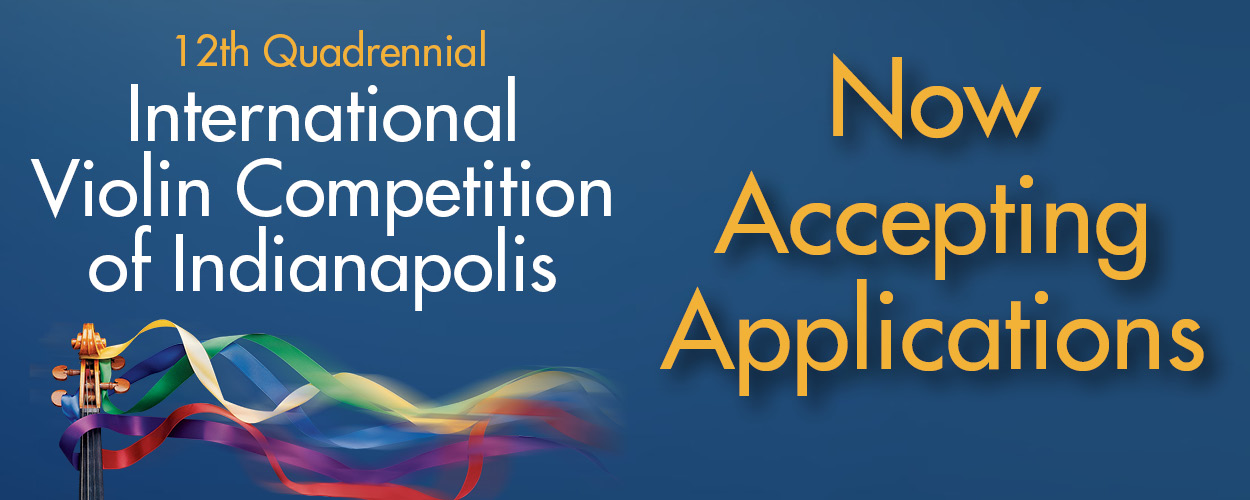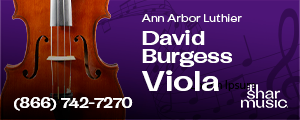Interview with Nikita Boriso-Glebsky: Uncovering Ysaÿe's Violin Concerto in D minor
Russian violinist Nikita Boriso-Glebsky has been working for more than five years to bring the recently-discovered Violin Concerto in D minor by Eugène Ysaÿe to a wider audience, and this week he will perform it in a series of concerts, including his Carnegie Hall debut that marks the New York premiere of the work.

Violinist Nikita Boriso-Glebsky. Photo by Marco Borggreve.
The concerts - entitled "Violinist as Composer" - feature the works of four European virtuoso violinists who were also major composers - Ysaÿe, Joseph Joachim, George Enescu and Grazyna Bacewicz - performed by The Orchestra Now (TON), conducted by Leon Botstein. (The concerts are May 4 and 5 at Bard College - click here - and May 8 at Carnegie Hall - click here.)
The effort to bring Ysaÿe's D minor Concerto to life actually started in 2017. Musicologist Xavier Falques knew that the score of the D minor Concerto was kept at the Juilliard library, and that it had never been performed or been printed or written into orchestra parts. Nikita recorded the first movement of the concerto for his A Tribute to Ysaÿe project, recorded in 2019 and released in 2020.
That project featured five discs' worth of music by the great Belgian virtuoso, whose life spanned the turn of the 20th century (1858 to 1931), years that encompassed a musical evolution from the Early and Late Romantic periods into the Modern period.
Nikita, winner of both the Jean Sibelius and Fritz Kreisler Violin Competitions, spoke with me this week about the music of Ysaÿe in general, and specifically about bringing the D minor Concerto to life, and how other violinists can go about studying this work.
Laurie: What is the first piece by Ysaÿe that you ever played, and what kind of an impression did it make on you?
Nikita: I think that was Sonata No. 3 "Ballade" for violin solo. I learned it during my first year at (Moscow State Tchaikovsky Conservatory) and remember a funny comment from my professor, Eduard Grach - "Your approach is very sensitive and musical, but instead of lasting 10 minutes, it should last six." At that time, I was still struggling a lot with technical difficulties and with Ysaÿe's language, completely new to me - which did not really leave me a chance to enjoy the music that much. But soon after the "Ballade," I learned his "Poème élégiaque," Op. 12, and that left a very strong impression - Ysaÿe's melodic talent, the way he broadened the violin's range by tuning the lower string to F, dramatic power in the climax, and a very well pictured dark-though-tender atmosphere. I fell in love with his musical language.
Laurie: I noticed there was another "long lost" concerto recently premiered, are there many others? How many concertos did Ysaÿe write?
Nikita: As far as I know, there were two major discoveries recently - the E minor concerto and the "Poème concertante," recorded by Philippe Graffin in collaboration with a Belgian musicologist Xavier Falques. Xavier was also intensively working on restoring the D minor concerto for my recording in 2019 - and thus for our current concerts. He mentioned three other works which he discovered aside from these three big opuses, but not of the same importance. As for concertos - it is difficult to say, it is a mysterious question... We have the so-called Concerto No. 8 in B minor, then D minor, E minor, and G minor - I'm not sure if that's authentic enough - but certainly we don't have traces of all 7 concertos preceding the 8th. I do hope, though, that Mr. Falques, who still continues working on Ysaÿe's legacy, will bring us more wonderful surprises in the future.
Laurie: What did you learn about Ysaÿe, as you uncovered this concerto with Xavier Falques? Is there a reason why it's remained unplayed for so long?
Nikita: I realized how critical Ysaÿe was towards his own compositions, since he never performed this piece himself - at least Xavier could not find any mentions of it in his letters and diaries. That allows us to assume that he probably was not yet satisfied enough with its style, language, or other characteristics. One can hear that this concerto is written much closer to the traditions of great romantic virtuosic concertos rather than to Ysaÿe's later style, which we know and admire today. Nevertheless, despite this fact, this opus remains a very inspiring "document" of the young Ysaÿe's genius searching for his unique way of expression.
Laurie: How playable is the concerto, what are its challenges? How would you compare the level to other well-known concertos? If another violinist wanted to learn it, how would they go about getting the music?
Nikita: As I mentioned, this concerto stands really near to the ones written by Wieniawski, Paganini, Vieuxtemps in terms of style and technique used. I would compare it firstly to Wieniawski No. 1 - the opening of the violin part sounds as a direct quotation - and to Vieuxtemps No. 4 - because of the importance of the orchestra part and the symphonic way of its narration. Hector Berlioz once called Vieuxtemps No. 4 "a magnificent symphony for orchestra with principal violin". Unfortunately, at the moment, we can consider the D minor Ysaÿe's Concerto as a single-movement one, but I hope in the nearest future we will be able to uncover and restore the other two movements and to hear the concerto in full colors.
Concerning the scores, one can find the score and the parts online, although it is pretty expensive and needs many corrections in keys and notes. Another option is to go to the website of the Juilliard School library and to see the manuscript of the score online. It is always very interesting but not very practical for learning, of course. I would love to encourage someone to create a piano arrangement, making it possible to study this concerto in classes and privately. I would be happy to provide the violin part. That would be a great contribution to the study of the heritage of Eugene Ysaÿe.
* * *
Nikita Boriso-Glebsky will perform with The Orchestra Now (TON) in its "Violinist as Composer" concerts this May 4 and 5 at Bard College and May 8 at Carnegie Hall. For Bard College concert tickets click here, for Carnegie Hall tickets click here. Nikita also will perform Joachim's Variations for Violin and Orchestra (in its first NYC performance since 1894); and TON will perform Bacewicz’s Partita for Orchestra and Enescu’s Second Symphony.
You might also like:
- Philippe Graffin Records Ysaÿe Violin Concerto in E minor
- Interview with Hilary Hahn: 100 Years of the Ysaÿe Sonatas
- Ray Iwazumi on Ysaÿe's Six Solo Violin Sonatas
* * *
Enjoying Violinist.com? Click here to sign up for our free, bi-weekly email newsletter. And if you've already signed up, please invite your friends! Thank you.
Tweet
Replies
This article has been archived and is no longer accepting comments.
Violinist.com is made possible by...
Dimitri Musafia, Master Maker of Violin and Viola Cases
International Violin Competition of Indianapolis
Johnson String Instrument/Carriage House Violins
Subscribe
Laurie's Books
Discover the best of Violinist.com in these collections of editor Laurie Niles' exclusive interviews.

Violinist.com Interviews Volume 1, with introduction by Hilary Hahn

Violinist.com Interviews Volume 2, with introduction by Rachel Barton Pine








May 4, 2024 at 05:17 PM · Interesting factoid: the Joachim Variations for Violin and Orchestra in E minor that Nikita is playing was the US premiere of that work…and the soloist? Eugène Ysaÿe!
NY Phil program for Dec 7 and 8, 1894.
Here’s a fine recording of the Joachim with Ricardo Odnoposoff: